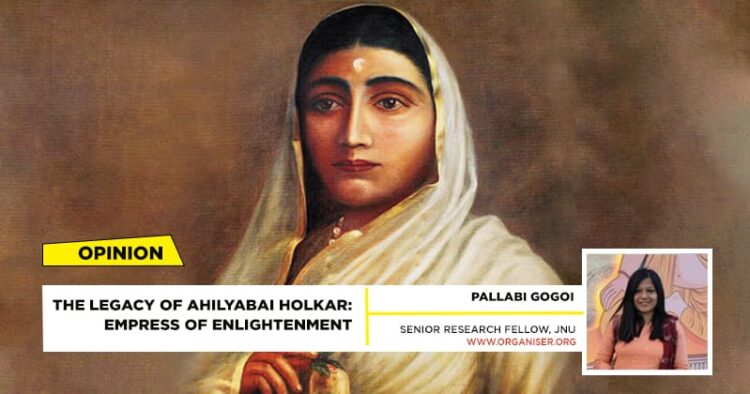In the rich tapestry of India’s captivating history, the name of Ahilyabai Holkar emerges as a beacon of enlightened governance, administrative acumen, and cultural renaissance. This article delves into the extraordinary saga of Ahilyabai’s reign and her profound impact on Indian history. While India has witnessed the rule of numerous female leaders, warrior queens, and poetesses, Ahilyabai Holkar’s legacy stands unparalleled for her achievements during her remarkable 30-year reign.
Revered for her piety, administrative prowess, and deep concern for her subjects, she is celebrated for her extensive philanthropic efforts, particularly in the construction of holy sites across the nation. Her rule over Malwa in the 18th century remains a paradigm of benevolent and effective governance.
Born in 1725 in the village of Chondi near Jamkhed, Ahmednagar, Ahilyabai was wedded at the tender age of eight to Khande-Rao Holkar, the sole heir of Malhar-Rao Holkar. Her charitable endeavors extended far and wide, earning her the epithet of “Devi” as her name became synonymous with charitable institutions throughout India. Ascending the throne amidst political tumult, Ahilyabai rose to the occasion, steering her realm towards peace, prosperity, and progress.
Upholding the principles of Dharma, or righteousness, she embodied these ideals in her actions and policies. Following the demise of Malhar-Rao Holkar, she was recognized by the Peshwa as the successor to the Jagheers of the Holkar family. However, Male-Rao’s subsequent demise left a void, compelling Ahilyabai to take matters into her own hands for the betterment of her kingdom and people. On December 11, 1767, she was duly enthroned as the Queen of Indore.
Despite facing encirclement by invaders presuming the kingdom’s vulnerability, Ahilyabai displayed remarkable courage in defending her homeland. Leading her soldiers into battle, she repelled enemy forces, earning the adoration of her people.
Notably, she wielded four bows and quivers of arrows attached to her favorite elephant’s howdah, symbolizing her prowess and determination. Beyond military valor, Ahilyabai’s rule was distinguished by her unwavering commitment to religious tolerance and harmony. Her benevolent initiatives encompassed the construction of temples, ghats, wells, tanks, and rest houses, transcending geographical boundaries and benefiting communities across her realm.
Among her enduring contributions, the restoration of the Kashi Vishwanath Temple in 1780 stands as a testament to her devotion to both faith and people, which was which had been destroyed in the past and subsequently converted into a mosque by Aurangzeb in 1669. Additionally, her meticulous efforts led to the rebuilding of the Vishnupad temple in 1787, showcasing her dedication to preserving sacred heritage.
Ahilyabai’s philanthropic endeavours extended across various locations, from Gaya to Somnath, from Ayodhya to Dwarka, leaving an indelible mark on India’s religious landscape. Her vision went beyond governance, as she spearheaded industrialization and economic development.
Recognising the potential of commerce, she implemented policies fostering entrepreneurship and innovation, transforming Maheshwar into a thriving center of trade and industry. Infrastructure development under her reign facilitated trade routes, laying the groundwork for economic prosperity. he spearheaded the establishment of a textile industry within the city, introducing the tradition of Maheshwari sarees.
This thriving handloom industry has undergone a remarkable transformation, with women taking center stage at the loom while men contribute to ancillary and external aspects of the craft. Ahilyabai’s unwavering support for merchants and traders served as a catalyst for entrepreneurship and innovation, paving the way for Maheshwar’s evolution into a bustling commercial center.
Ahilyabai Holkar was remarkably progressive for her era. Despite prevailing norms that forbade women’s education, she was well-educated and championed the cause of female learning. In the tumultuous backdrop of invasions during the 18th century, educational opportunities for women in India dwindled. Nevertheless, Ahilyabai emerged as a beacon of inspiration, advocating for the reintroduction of female education.
Furthermore, she vehemently opposed the inhumane and discriminatory practice of Sati Pratha, which was widespread in northern India. While few women dared to challenge this centuries-old tradition, Ahilyabai fearlessly stood against it, affirming her commitment to justice and morality. Moreover, her patronage of the arts and literature enriched the cultural fabric of her realm. Maheshwar emerged as a hub of artistic excellence, attracting scholars, poets, musicians, and artisans.
Under Ahilyabai’s reign, governance was not merely theoretical but practical, aimed at enhancing the lives of her subjects. Her administrative reforms prioritized accessibility, fairness, and accountability. Despite her busy schedule, she remained accessible to her people, ensuring justice was dispensed swiftly and impartially.
Ahilyabai’s commitment to economic development extended to agriculture, trade, and commerce, uplifting the rural economy and fostering entrepreneurship. Her patronage of temples and religious institutions, alongside her support for mosques and gurudwaras, fostered an environment of religious pluralism and harmony. Her efforts towards the renovation of sacred sites underscored her reverence for faith and heritage.
Furthermore, her patronage of the arts and literature contributed to a cultural renaissance, establishing Maheshwar as a center of artistic excellence. Ahilyabai’s reign represents a golden era in Indian history, characterized by peace, prosperity, and cultural flourishing.
Her legacy serves as a timeless reminder of the transformative potential of visionary leadership and compassionate governance. In commemorating her memory, we honor not just a historical figure but an embodiment of courage, wisdom, and compassion—an eternal symbol of female empowerment and leadership in India’s illustrious history.


















Comments